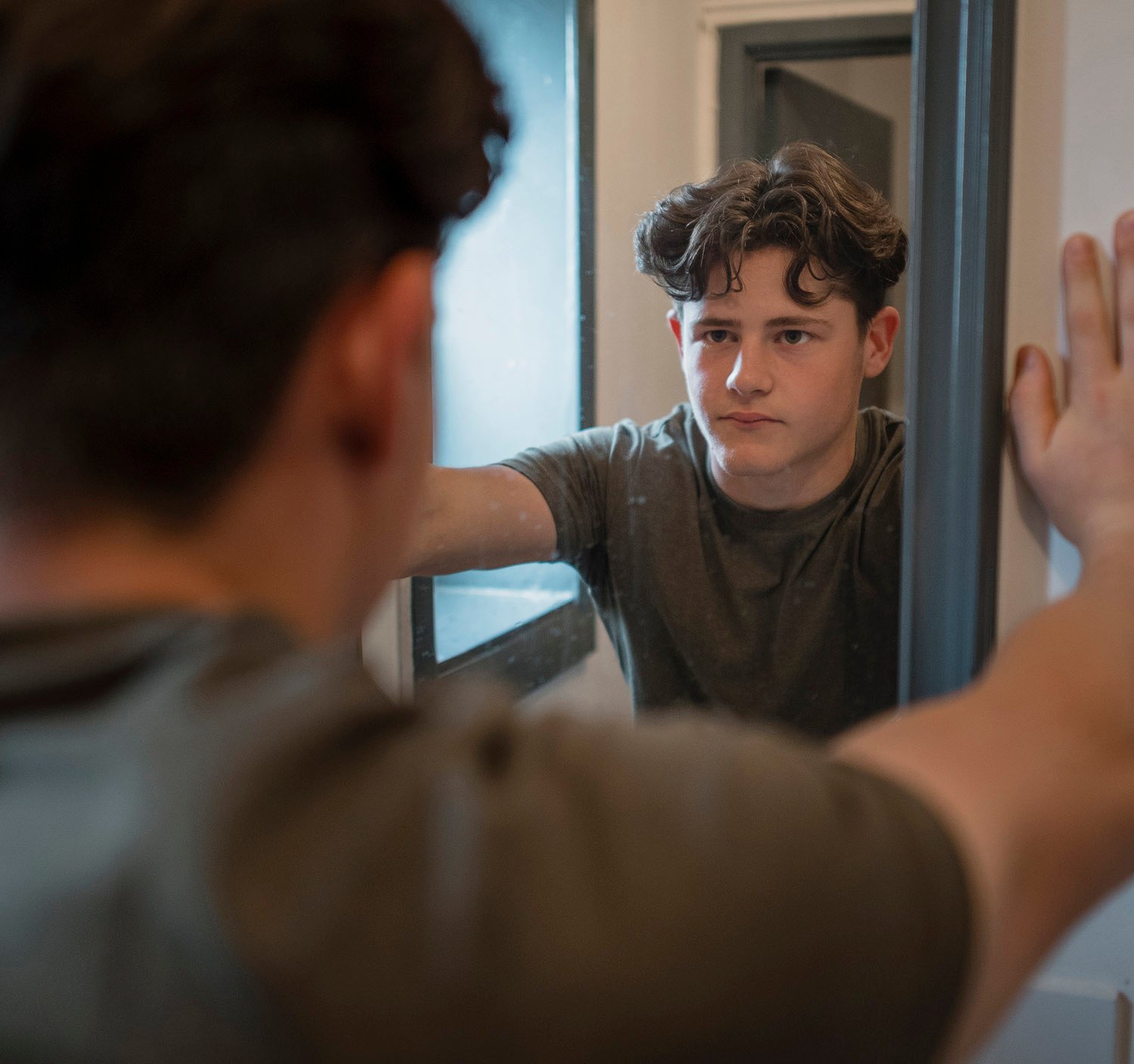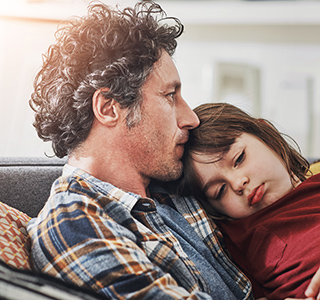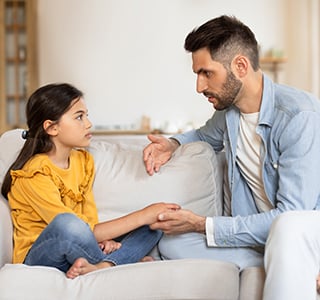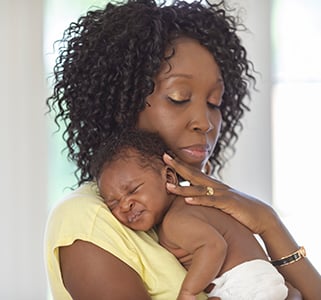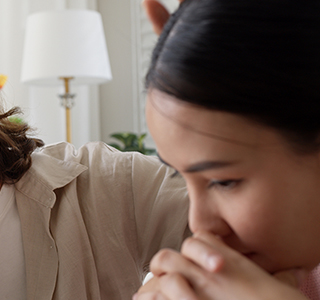It's not perfect. It's parenting.
Sometimes you need answers to the little everyday things that parents encounter. And sometimes, you just need someone to encourage you through all of the craziness and challenges of parenthood. Welcome to Parent-ish, a blog from the experts at Children's Mercy.

Get updates
Have a parenting hack to share? Or a topic you'd like to see?
Category: Tough topics
Outbreaks don’t come with a manual – but this can help
Let’s be real: parenting during an outbreak like the flu or measles is like trying to juggle flaming swords while riding a unicycle—on a tightrope—over a pit of Legos. It’s a lot. And while we can’t make the germs go away (if only!), we can help you feel a little more prepared, a little more grounded and a lot more supported.
Addressing body image concerns in teen boys
While stereotypes may say differently, body image issues are not exclusive to girls; they are increasingly prevalent among teen boys as well, often leading to significant mental and physical health challenges. As parents, understanding these issues and knowing how to support your son or other teen boys in your life is crucial. Keep reading for insight into common signs of body image issues, the role of social media and ways to help foster a healthy body image.
When a pet dies: How to help your child grieve
Pets play a significant role in many children’s lives. Kids who are actively engaged in pet care can form deep bonds that resemble human-to-human relationships. Pets can be companions, confidants, friends and sources of comfort. In some cases, pets are almost like siblings. When a pet dies, children experience significant loss. Keep reading to learn how you can help your child grieve when you lose a pet.
5 teen relationship red flags
I spend a lot of time talking to patients and parents about healthy relationships. It’s common for teens to have some less-than-great experiences as they take more ownership over their social lives. With support from schools, health care professionals and other trusted adults, parents can help adolescents prioritize positive connections and avoid harmful dynamics.
Resources for helping kids process the anniversary of the Super Bowl parade shootings
The horrific events that took place after the 2024 Chiefs parade and rally at Union Station may again strike fear a year later, especially for children and families who were at the parade and witnessed terrifying things. Anniversary reactions are a common part of the recovery process after tragic events, especially those that include loss and fear. To support your child, we've created resources and guidance on what to look out for.
How to support your kids through big life changes
Most children will experience impactful life changes – “big” changes. Even expected life transitions can be stressful and feel “big” to kids, such as a sibling leaving for college, transitioning from elementary school to middle school or having a new team or coach. Your goal as a parent or caregiver is to give your kids the skills and tools to navigate these changes successfully and help kids feel confident they can cope with these feelings and act in ways that help them adapt to change.
Dealing with parenting peer pressure? Our providers have been there, too.
Parenting is hard, and is even harder when friends, family or even your children have opinions on your parenting choices. If you’ve ever felt this way you're not alone – experts in the pediatric health field experience this, too. Keep reading to learn how this panel of parents has had to uphold their boundaries and provide advice for you to do the same.
How to talk with kids about cancer
Cancer is not an easy thing to talk about. It’s understandable why many parents and caregivers feel hesitant to talk with their kids about it. As uncomfortable as it may be, it’s important to be honest with young people about cancer. Talking openly helps relieve anxiety and builds trusting relationships. If someone in your child’s life is diagnosed with cancer, it will affect them. Whether that person is a close family member, a friend, someone at school or in their after-school activities, creating space to talk about cancer is beneficial for your child and for your relationship with them.
Teaching kids not to bully – and how to react if you find out they are
We all think the best of our kids – but that doesn’t mean at some point, they won’t exhibit bullying behaviors. Why does this happen, how can you teach your kids not to bully and most importantly…how do you react if you find out they’ve bullied a classmate or friend?
Why kids hit – and what parents can do about it
It’s a scenario many parents are probably familiar with: one second your children are playing quietly together, and then all of a sudden, you hear crying and shouts of “Mom, they hit me!” When this happens the first time, parents are often at a loss. Why are my children hitting, and what the heck should I do about it? We have answers to your questions on the whys and best ways to discipline if your child hits.
6 things parents should know about opioids
In the past 20 years, illegal use of opioids has risen sharply. Many people have family members struggling with addiction or have lost loved ones to overdose. What do parents need to know to keep kids safe?
How to talk with kids about foster care
Kids often come to parents with questions we aren’t prepared to answer. We may panic and shut down the conversation, put them to sleep with a wordy monologue, or tell them to ask another parent. But those aren’t our only options for talking about complicated topics like foster care. We’ve gathered a few tips based on our experience to help you and your child have a productive conversation you can feel good about.
Are you a new parent feeling sad, tired or anxious? Here is a guide to help.
While many moms and other birthing people experience the “baby blues” in the first 2 weeks after having a baby (worry, sadness and tiredness), these symptoms usually resolve on their own. However, Perinatal Mood and Anxiety Disorders (PMADs) can be more serious
Anxiety and depression: what parents and caregivers should know
Mental health is becoming more commonly talked about and less stigmatized, which is a step in the right direction. Still, many adults are unsure of how to support children’s mental wellbeing. Sadness and nervousness are normal human emotions, so how do you know what type of support to give your child? We’re sharing guidance from our clinical expertise to help you answer that question.
How to talk to your kids about their first heartbreak
Our first love can be a highly emotional experience and the same goes for first heartbreak. It’s never easy to see your child hurting, but you can ease their struggle by remaining open and available to listen.

